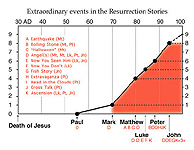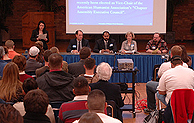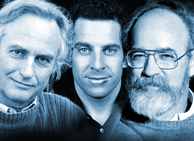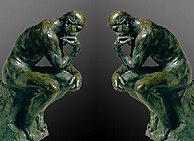 The following was a talk titled, "Stoicism And Rational Psychology" by Frederick Edwords, Executive Director of the American Humanist Association. It was prepared for the Humanist Association of Massachusetts and delivered Sunday evening, February 14, 1993, at the Harvard Science Center. Many thanks to Mike Darley, who I know through the Houston Church of Freethought and the Humanists of Houston, for bringing it to my attention...
The following was a talk titled, "Stoicism And Rational Psychology" by Frederick Edwords, Executive Director of the American Humanist Association. It was prepared for the Humanist Association of Massachusetts and delivered Sunday evening, February 14, 1993, at the Harvard Science Center. Many thanks to Mike Darley, who I know through the Houston Church of Freethought and the Humanists of Houston, for bringing it to my attention...--------------
"To be a philosopher," said Thoreau, "is not merely to have subtle thoughts, nor even to found a school, but so to love wisdom as to live according to its dictates, a life of simplicity, independence, magnanimity, and trust. It is to solve some of the problems of life, not only theoretically, but practically."
Yet that's often what we Humanists have overlooked in many of our activities. To solve some of the problems of life, or help others solve them, in very practical and down-to-earth ways, is, in the final analysis, what I think the Humanist philosophy was developed to accomplish. After all, Humanism can be defined as a commitment to the use of reason and observation in the service of human need and interest in the here and now. And, as such, it is an ethic that aims at what thinkers ancient and modern have termed "the good life." For Humanists, the good life is one where reason is the tool and happiness the goal -- happiness both for ourselves and others.
Now, if modern Humanism were to trace its roots to some particular ancient philosophical system, what system would that be? Well, given our heritage in the freethought movement, there is a tendency to choose Epicureanism. It's founder, Epicurus, challenged the religious traditions of his day, declaring clearly that the superstitious fear of hellfire was a major cause of human misery in the here-and-now. That sort of thing warms the hearts of the debunkers among us. But did the Epicureans, or their Cyrenaic forebears, have the right idea on how happiness is attained? I don't believe they did.
Contrary to the teachings of these ancient hedonists, it seems that happiness can rarely be attained directly, through a forthright pursuit of a well-balanced set of pleasures. Happiness is rather like "wellness." Its prerequisite is an absence of disease. And when it came to providing that prerequisite, to relieving the diseases of the mind, and even of society, it was the ancient Stoics who often proved to be the best philosophical doctors.
Bertrand Russell, in his book The Conquest of Happiness, set forth the Stoic dictum in modern terms. "I believe," he wrote, "unhappiness to be very largely due to mistaken views of the world, mistaken ethics, mistaken habits of life..." Following Russell's lead, 1971 Humanist of the Year Albert Ellis has taken a similar approach. In his Rational-Emotive Therapy, which he freely acknowledges as humanistic and rooted in ancient Stoicism...
And it was for this purpose that the Roman Stoic philosopher Seneca wrote his essay On the Shortness of Life. In that essay, he drew attention to the fact that people often don't get their lives in order in anything like a timely way. He wrote:
The majority of mortals complain bitterly of the spitefulness of nature, because we are born for such a brief span of life, because even this space that has been granted to us rushes by so speedily and so swiftly that all save a very few find life at an end just when they are getting ready to live. Yet the life we receive is not short, but we make it so, nor do we have any lack of it, but are wasteful of it.And he added, "
our life is amply long if ordered properly."
What Seneca meant here was that people would do well to have more concern for the values and priorities of life. He was urging his readers to reconsider their goals, to reassess themselves, to give the truly important things more time, and to act now.
We can we look around us today and see many people living life on what might be called the "deferred payment plan." Children commonly say, "Just wait until I grow up." Students can't wait until they finish school and leave home so they can begin to live as they like. When young people date, they look forward to the time when they will be married. Then they'll be happy. When married they look ahead to owning their own home. Then they'll be happy. When winter comes, they look to Spring, or to the day they can move to California. If they have children they say, "When the kids grow up and leave home, then we'll be able to do what we want." Of course there's still the job. So they look to retirement as the time to live. Seneca denounced this attitude in the strongest language:
Are you not embarrassed to reserve for yourself only the remnant of life, and to set apart only that time which cannot be devoted to any business? . . . What foolish forgetfulness of mortality to postpone wholesome plans to the fiftieth and sixtieth year, and to intend to begin life at a point which not all have even attained!"Seneca believed that we can live now, every day, can find our meaning and joy at this time, not some other. Don't wait for happiness, he argued, create it.
Albert Ellis has written much on not worrying about what other people think. So did the [stoic] Roman Emperor Marcus Aurelius who, in his Meditations said:
Constantly observe who they are whose approval you seek, and by what principles they are guided. For if you look to the sources of their opinions and appetites, you'll neither condemn those offenses they give nor desire the approval they withhold.It is a Humanist dictum that this life is all and enough. We will pass this way but once and no one can guarantee any paradise waiting just beyond the grave. This is probably our only shot. But the possibilities of this life are sufficient to give meaning to our existence. For it is in the context of this life that we love, laugh, experience nature, pursue goals, and enjoy triumph. And to better enjoy these things we cultivate courage, bear adversity, and rise up from the ashes of failure. Yet so many do give up the good life. They join ascetic religious orders, political mass movements that put all the benefits ahead to future generations, adopt creeds of excessive self-denial. The price people pay in adherence to such ideas, devotion to charismatic leaders, and involvement in fanatical crusades is staggering. Seneca could have had such people in mind when he wrote:
They spend life in making ready to live! They form their purposes with a view to the distant future; yet postponement is the greatest waste of life; it deprives them of each day as it comes, it snatches from them the present by promising something hereafter. The greatest hindrance to living is expectancy, which depends upon tomorrow and wastes today.Many ex-fundamentalists have found this out too late, often regretting sacrificed years. This can lead them into a frantic effort to make up for lost time. For example, when an article on Fundamentalists Anonymous, an organization for ex-fundamentalists, appeared in an issue of Penthouse magazine, the positive response from ex-fundamentalists was overwhelming, since so many were reading the magazine to catch up on some of the living they had earlier missed.
Humanism, on the other hand, is a philosophy for today, for the here and now world of our senses and aspirations. It is an ethic that puts life first, death last. It is a way of life that finds joy in a spring flower or the crash of waves on the seashore, in a momentary human encounter or the purr of a kitten. It is a focus that includes purposeful goals, meaningful pursuits, and high aspirations...
Bertrand Russell in
The Conquest of Happiness, referred to "zest" as "the most universal and distinctive mark" of the happy individual. People with this quality, Russell argued, are those who come at life with a sound appetite, are glad to have what is before them, partake of things until they have enough, and know when to stop.
To some, this vision sounds a bit like Omar Khayyam:
A Book of Verses underneath the Bough,A Jug of Wine, a Loaf of Bread--and ThouBeside me singing in the Wilderness--Oh, Wilderness were Paradise enow!Ah, make the most of what we yet may spend,Before we too into the Dust descend;Dust into Dust, and under Dust to lie,Sans Wine, sans Song, sans Singer, and--sans End!Which comes close to the hedonistic doctrine Humanists are accused of advocating: Eat, drink, and be merry, for tomorrow we die.
Or, as Mad magazine once put it –
A Jug of Wine, a Loaf of Bread, and Thou--Pretty soon I'll be drunk, fat, and in trouble.But we needn't take Omar the Tentmaker literally when it comes to all that drinking and carousing. The physical pleasures are far from representing the whole. For the Humanist there are also the pleasures of an unfettered mind making new discoveries, solving problems, and creating. There is the enjoyment of art, music, dance, and drama. There is the joy of helping others and the challenge of working to make the world a better and more peaceful place. And, of course, there are the joys associated with love and family. The Humanist seeks the enjoyment of as many of these as reasonable, and cannot do so if an over-focus on just one overtakes life completely.
In this, we are clearly at one with the ancient Greek ideal of wholeness and the integration of life. For example, in the ancient Olympic games, competition included not only athletics but drama, music, poetry, and philosophy. And the whole combination was viewed as a religious event. The Greeks put it together and did it all. So can we.
Such a worldly and good-natured view of life that claims no ultimate knowledge....is radically different from conservative Christianity, which has sometimes called this world a veil of tears, has seen pleasures as vanity, and seems to find the goal of human life beyond the grave. Such believers might quote Ecclesiastes --
Better a good name than costly oil,the day of death than the day of birth.Better to go to the house of mourningthan to the house of feasting;for to this end all men come,let the living take this to heart.Better sadness than laughter,a severe face confers some benefit.As an antidote, Robert Louis Stevenson offered these words in his Christmas Sermon:
Gentleness and cheerfulness, these come before all morality: they are the perfect duties. If your morals make you dreary, depend on it they are wrong. I do not say, "give them up," for they may be all you have; but conceal them like a vice, lest they should spoil the lives of better men."Yet, now we can ask, if this good life is to be the goal, is it a goal accessible only to the affluent, the intelligent, the educated? If so, then we are advocating a way of life only for a relative few of the world's people.
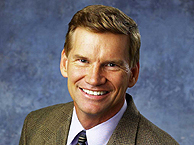 Most are aware of the Ted Haggard scandal at New Life Church involving homosexual activity and drug use. In another recent news item involving a gay sex scandal, Paul Barnes has resigned from his pulpit at the Grace Chapel megachurch in Denver. In yet a third news item, back at New Life Church, another pastor, Christopher Beard, has admitted to sexual misconduct and resigned. Of course, we all know of the many allegations against Catholic priests in the news media as well. I do not mention these to 'kick a religious group when it's down', but rather to ask what in the world is going on here?
Most are aware of the Ted Haggard scandal at New Life Church involving homosexual activity and drug use. In another recent news item involving a gay sex scandal, Paul Barnes has resigned from his pulpit at the Grace Chapel megachurch in Denver. In yet a third news item, back at New Life Church, another pastor, Christopher Beard, has admitted to sexual misconduct and resigned. Of course, we all know of the many allegations against Catholic priests in the news media as well. I do not mention these to 'kick a religious group when it's down', but rather to ask what in the world is going on here?
